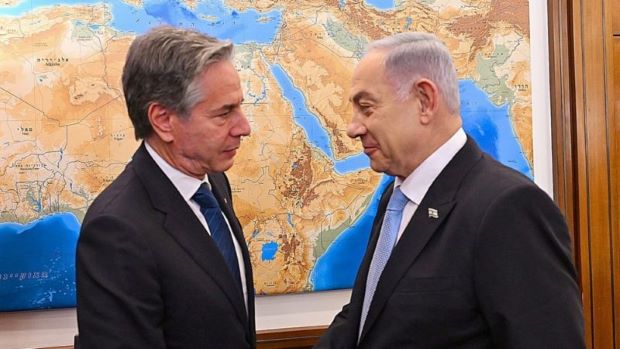Israeli and Hamas officials see little chance for ceasefire breakthrough
By Ronen Bergman, Adam Rasgon and Aaron Boxerman
JERUSALEM — The Biden administration is again putting its diplomatic heft behind an effort to dislodge months of stalled negotiations between Israel and Hamas to end the 10-month-long war in the Gaza Strip, and voicing optimism over the potential for a breakthrough.
Israeli and Hamas officials are striking a far different tone. Both sides have poured cold water on the idea that a deal could be imminent, saying that mediators’ efforts — and the latest American proposal aimed at bridging gaps between the two sides — have failed to resolve some of the most substantive disputes in the talks.
On Monday (19), Secretary of State Antony Blinken, making his ninth visit to Israel since the war began, emerged from a three-hour-long meeting with Prime Minister Benjamin Netanyahu and announced that the Israeli leader had assented to the new US “bridging proposal”, introduced at talks in Qatar last week.
But Israeli and Hamas officials familiar with the talks said the US plan left major disagreements mostly unresolved. Hamas quickly dismissed the American-led framework as conforming to Netanyahu’s conditions, which he has stiffened in recent weeks. And on Tuesday (20), Netanyahu showed little sign of being ready to compromise, repeating his message that Israel would do everything to “preserve our strategic security assets” and “will continue to fight until total victory is achieved over Hamas”.
On Tuesday, as Blinken travelled to Egypt and Qatar to continue pushing for an agreement, Hamas issued a statement criticizing “misleading claims” by the Biden administration about the talks. It said the latest American proposal amounted to “a reversal” of a framework that Hamas had presented in early July and that US officials repeatedly called a breakthrough.
The negotiations have taken on renewed urgency following the assassinations of Hamas’ political leader, Ismail Haniyeh, in Tehran, Iran, and Fouad Shukur, a senior Hezbollah commander, in Beirut in late July. Diplomats hoped that a cease-fire in Gaza, or even the prospect of one, might persuade Iran and Hezbollah to hold off or blunt their reprisals.
Under the new US proposal, Israeli troops would be able to continue to patrol part of the Gaza border with Egypt, albeit in reduced numbers — one of Netanyahu’s core demands, according to four officials familiar with the talks, who spoke on condition of anonymity because they were not authorized to speak publicly.
That is likely a non-starter for Hamas, which has consistently called for a complete Israeli withdrawal from the Gaza Strip. Egypt has also voiced staunch objections to a long-term Israeli presence in that area, known as the Philadelphi Corridor.
Cairo has maintained that it will not accept Israeli troops remaining in the Philadelphi Corridor, which Egyptian officials say would pose national security concerns and would likely anger the Egyptian public.
In a sign of Egypt’s frustrations, state-controlled media outlets, which serve as government mouthpieces, have escalated their language against Israel in recent days, accusing it of trying to pick a fight with Egypt over the corridor to delay progress on a cease-fire in Gaza.
“Netanyahu doesn’t want a ceasefire. So he is creating an artificial problem with Egypt,” a former general, Samir Farag, said on one talk show that aired Monday night.
During the ceasefire talks that ended on Friday (16), US officials also asked to delay in-depth conversations over Israel’s demand to screen displaced Palestinians returning to northern Gaza for weapons, another key stumbling block, according to two officials familiar with the talks.
Over the past several months, US officials have repeatedly sought to drum up momentum in the negotiations mediated by Egypt and Qatar. In May, President Joe Biden endorsed an Israeli-backed ceasefire proposal, saying both sides had reached a “decisive moment”. The talks crept along for months until the Hamas counterproposal in July and then stalled.
The talks now appear to be at risk of reaching yet another dead end.
The United States, alongside Egypt and Qatar, have called for another summit in Cairo before the end of the week. Two Israeli officials, who also spoke on condition of anonymity, said that a date for the meeting had yet to be set and that it was unclear where it might be held. Hamas did not participate in the last round of talks, and it has not said whether it will agree to join this time.
-New York Times



Comments are closed, but trackbacks and pingbacks are open.